Devon and Nico Hase link Retreat and Marriage
Written by: Steve Wilhelm
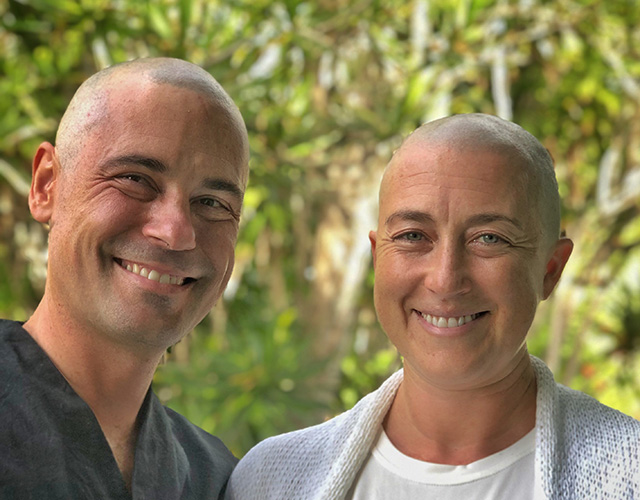
D&N photo 1 – Devon and Nico Hase with shaved heads, after both took semi-monastic vows (including celibacy) for a year.
Photos by: Isabella Thorndike Church, Natalie Faye, Nico Hase, Scott Spangler, Flint Sparks
Editor’s note: Devon and Nico Hase have been for years honing a marriage singularly focused on deep dharma practice, so they spend more time in deep retreat than many monastics do. They live and practice together in an apartment at Kagyu Sukha Chö Ling in Ashland, Oregon, except when they’re in solitary retreat in mountain cabins, or on the road teaching or studying. They mentor students online, and wrote a book together, “How not to be a Hot Mess.” Devon is 40, Nico 43. The interview was in turns serious and funny, with lots of laughter.
You met when you were living in separate isolated retreat centers in Colorado, far from each other. How did you decide to marry?
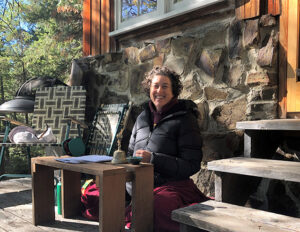
Devon during a three-month solo retreat, fall of 2020.
Devon – Well, in one of our first conversations, Nico said to me, “I’m not really dating material.” He was just really committed to deep dharma practice. I told him, “Great, I’m going into three-year retreat.” But because we both had this commitment to dharma, we had a lot of parallel visions for our lives.
Actually, I felt right from the beginning, I don’t know many other people, my age, who are this dedicated to the dharma. It felt like such a gift, an extraordinary gift, to talk to someone who was so committed.
From that first conversation we were always talking about doing long retreat together. We were asking, How do we support retreat practice right in the middle of a relationship? That’s an on-going koan that we hold for each other.
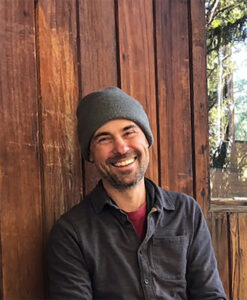
Nico Hase during a three-month solo retreat in the fall of 2020.
What is unique in your marriage vows that relates to your Dharma commitments?
Nico – We wrote our own vows, and the vows were organized around this theme of being partners in awakening. Even in our wedding ceremony, the intention was to figure out how can we support each other in this depth of spiritual practice, and how can we continue, in our marriage, to be as committed as we were before we met.
What are your dharma commitments, individually and as a couple?
Devon – We’ve both taken the bodhisattva vow, so we’re going for full awakening for the sake of all sentient beings [laughs]. No, I mean both of us really do hold that at the center of our lives. We’re going big, we want to be enlightened.
In terms of our daily practice we have periods of silence, and then we have conversation time. We don’t eat dinner, we’re pretty committed to cutting down on our social life so we have more time to practice. We have gradually over the years settled into renunciation, and semi-retreat lifestyle, and that means stepping out of the mainstream expectations of what a couple might look like.
Nico – Every morning we wake up and try to practice to 11 in the morning or so, then we’ll have lunch together, and lunch is a time where we can talk to each other, and have a normal conversation. Then we’ll usually work until about five, doing dharma mentoring one-on-one with folks, teaching for Jack and Tara’s Mindfulness Meditation Certification Program or Cloud Sangha, or sometimes leading retreats. Then we do a check-in around 5 p.m, a dialogue practice, and then we try to start practicing at 6 p.m. and practice for some time and go to bed.
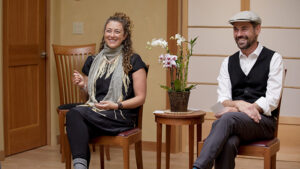
Devon and Nico teaching in Ashland, Oregon, in 2018, just after three-month retreat.
How do you manage deep retreat time?
Devon – Ninety percent of the time we’re really good at supporting each other, and 10 percent of the time we’re in super-sensitive places in practice, and maybe our relationship makes it difficult to be in that process together.
I do think we’ve learned because we’ve experimented so much, with each of us going on retreat, sometimes apart and sometimes together. We’ve found a way to really take our own space. For example, we know we each need our own meditation space, we can’t be sharing the same one-room cabin.
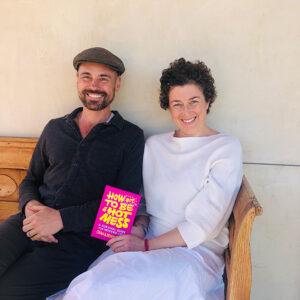
Devon and Nico with their book “How to not be a Hot Mess,” just before the pandemic forced them to cancel a planned book tour.
What’s your balance of practice in Ashland, retreat and teaching?
Nico – These days it seems we’re nine months of the year in town, and three or four months in the cabins. The cabins are just 45 minutes up in the mountains. We have a wonderful friend who has these two retreat cabins, and she lets people in our community use them.
What strains does this focus on retreat place on your marriage?
Devon – One of our biggest struggles has been how do we balance time apart and time together. For instance, I’ve been engaged in pretty intense teacher training at IMS for four years now, and that meant a lot of travel, a lot of being away. While that was an amazing experience, and really blessed and transformed our lives, it was a strain.
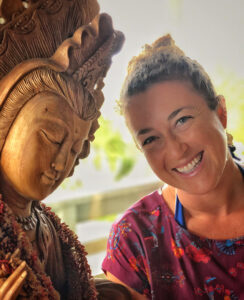
Devon next to Kuan Yin on the island of Molokai’i, Hawai’i, 2019.
What do your families think of the paths you’ve chosen?
Devon – They balked at the beginning for sure, when I was 20 years old. Now, more and more as mediation is more popular and mainstream, they are delighted we’re doing what we love, and they’re very supportive.
Nico – My family has also had decades to acclimate. I think they just accept this is who I am and this is what I do. They are stunned and excited I can make a living doing this, and nobody expected that including me. They kind of roll with it now that they know I’m going to spend three months in retreat every year. They’ve gotten really good at supporting me.
Currently your practice is mostly Tibetan while you teach early Buddhism. How does that work?
Devon – I’ve always had the two tracks. My first retreat was at Spirit Rock, and my first two teachers were in the Tibetan tradition. I’ve had these two parallel practices that in my own experience weave and support each other.
I honor the integrity of each, and in my teaching I don’t mix them. I think it’s important to be clear about lineage when we’re teaching. But personally they’re absolutely complementary and I need both of them to offer different perspectives. I’ve been trained as an insight meditation teacher, and I’m committed to that as a teacher.
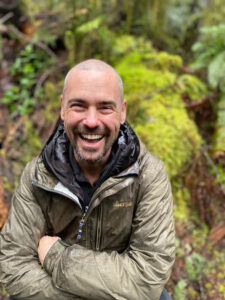
Nico brings together his love of Dharma and the outdoors.
Nico – When I teach I feel I’m teaching in what Joseph Goldstein called the “One Dharma” lineage. It’s basically vipassana, but it picks up some flavors from other teachers and other traditions. Still, I’d say it has an integrity shaped by Early Buddhist tradition.
I like Joseph’s frame that all dharma meets at one point, and that one point is non-clinging, or liberation from clinging. We live in a time where we are exposed to multiple streams. It’s very difficult to ignore the various wisdom teachings. The skill is how do we honor the unique contributions of each one.
Devon – What’s inspiring to me is to read the life stories of all of these masters, in all the traditions…Thailand, Burma, Tibet, the early Indian teachers, the disciples of the Buddha. Because I think in a certain way we’re always holding the tension between tradition and innovation.
What’s your intent by age 75?
Nico – I hope to be liberated from suffering. That may sound a little grandiose, but it’s my way of taking the dharma seriously. The Buddha said it can be done, so I want to try and do it.
Devon – When I think about my teachers like Joseph who is around 75, and other teachers like Bhikkhu Analayo, Mingyur Rinpoche, Dipa Ma, (although I never met her in person) when I think about these teachers who really have realized the teachings, I think well, maybe by 75 I could do it.
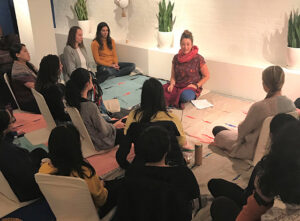
Devon offering a workshop at Scarlet Sage in the Mission District of San Francisco.
How does your work make a difference in the world?
Devon – I suppose for me the dharma is about cultivating qualities the world needs so badly right now. As we practice I see more clarity in this mind, I see more of a sense of justice, what’s right and what’s wrong. I can see that more clearly when I’m practicing.
Clear seeing, compassion, practices of the heart, the simple joy that’s cultivated in practice, equanimity, these are the qualities the world needs.
Nico – Well, until recently I really worked on the front lines. I was a counselor in all these settings: in-patient psych, prison, community mental health, with folks who have been historically marginalized. These days I’m one step removed from the front lines, but a lot of people I work with are climate activists, or they’re focused on racial justice issues, or they’re doctors, or they’re social workers, and I feel I’m providing support for them to do work that is necessary in the world.
Steve Wilhelm is editor of Northwest Dharma News. A former journalist, he has edited four dharma books. He teaches dharma through Seattle Insight Meditation Society and Eastside Insight Meditation, and serves on the board of Tibetan Nuns Project. He lives in Kirkland, Washington with Ellen his wife, and cat Aerazele and dog Blu.
